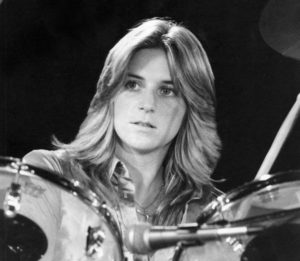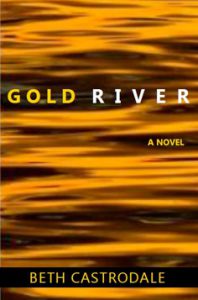
In high school, I harbored a secret desire to become a rock drummer. Why the desire? I can’t say, exactly. Maybe it had something to do with the fact that I love moving to music. Maybe it had something to do with Buddy Rich’s insane-pants drumming, which has left me in awe since I first caught it on The Tonight Show.
Why the secret? I worried that the desire was preposterous, and I was sure others would find it so. It was the late seventies and early eighties, and at that time I had no idea that other “girl drummers” were already making their mark: Sandy West of the Runaways, to name just one example that might have inspired me. Because of these doubts and fears, I never asked my parents for drum lessons, much less imagined that there might eventually be a place for me in a band.
But desires of any significance aren’t so easily banished. So well into my forties I decided to take drum lessons, and I kept them up for five years. Although I never joined a band, I reaped many other benefits: the lessons (and my hours of practice) helped me physically engage with various beats, making me more attuned to the rhythms of live and recorded music. Also, I truly felt the burn in my brain as I learned to read sheet music for drums, and it was satisfying to figure out new drum scores, especially challenging ones. Finally, the drumming offered a great escape from the stress and worries connected to my job and other aspects of my life.
Creative Hobbies Can Make You Happier, Less Stressed, and More Mentally Fit
My own experiences are far from unique. In Fast Company, Kevan Lee reported on research indicating that engaging in creative hobbies can make you happier and healthier—and also more effective at work. In a study of more than 400 employees, psychology professor Dr. Kevin Eschleman and his colleagues found that workers with a creative hobby were more likely to be collaborative, helpful, and creative at work. Also, when not at work, employees with such hobbies felt more relaxed and in control.
Lee also referred to a paper from the European Journal of Work and Organizational Psychology, which recommends “meaningful leisure activities for … growth and development,” rather than activities that just offer an “escape” from work. Escapism, the paper reports, “is frequently associated with a passive lifestyle and boredom, which in turn might feed into apathy and depression.”
In Psychology Today, Dr. Jaime Kurtz points to other benefits of hobbies. For one thing, they promote flow, when “[t]ime flies, self-consciousness disappears, and you are fully immersed in the activity at hand.” Hobbies that involve other people, such as playing in a band or participating in a knitting group, can also promote social connections, another source of happiness. Furthermore, Kurtz writes, hobbies help you cope with stress—not just because they can distract you from it but because they can expand your sense of self. You are not just, say, a beleaguered or criticized employee; you are also an athlete or artist. “Simply put,” she says, “your eggs aren’t all in one basket.”
Researchers from the University of Texas at Dallas have also found that seniors who take on challenging hobbies, such as digital photography or quilting, can see lasting improvements in their memory.
“Now quilting may not seem like a mentally challenging task,” says Dr. Denise Park, who led the study. “But try it! If you’re a novice you’re cutting out all these abstract shapes, it’s very demanding and complex task.”
Key to improving memory is learning a new skill, the more challenging, the better. Park and her colleagues found that seniors who engaged in skill-building hobbies saw “significant brain gains” compared with seniors who did puzzles, listened to music, reminisced about the past, or took part in other less challenging activities.
Finding a Good Hobby, and Making It Work for You
You might do as I did: take up an activity that you’ve always wanted to try. Or you could return to a hobby that you used to enjoy but put aside.
Natascha Chtena, in writing of the pleasures of making things by hand, recommends this approach: “take a look at your life and think about parts you’d like to improve. Are there things you enjoy but can’t afford readymade? Are there products you’re using that aren’t quite meeting your needs? Things you’d like to improve?”
In response to these questions, you might brew a style of beer you haven’t been able to find in stores, or make cleaning products that have less impact on the environment than conventional ones. Chtena recommends keeping things small and simple at first. For example, you might try out a simple beer recipe that doesn’t require purchasing a lot of expensive equipment or supplies. If time, interest, and finances allow, you can work your way gradually toward more complicated or elaborate creations.
Some other tips:
- Set a realistic goal. This will help you manage both your time and your expectations. My goal with drumming was to become reasonably competent at playing some basic beats and at reading music, and to just have fun. I never expected that I’d become a great drummer (I didn’t), but I did expect that I’d enjoy myself (I did).
- Figure out how much time you can devote to your hobby, and make reasonable accommodations for it. I felt I could meet my goal with a couple of hours of lessons a week and with three to five hours of practice a week, depending on other demands on my time, which included a full-time job and my desire to write novels and stories. Top drummers devote far more hours to practice than I ever did. But I wanted my hobby to make me feel happy and engaged, not even more stressed.
- Reassess things every few months or so. When you do, ask yourself questions like these: Does my hobby still interest and challenge me? If not, what other aspects of it might I explore? What other relevant skills should I develop? Am I making good strides toward my goal? If not, what might be getting in the way? Should I rethink my goal or the ways I’m pursuing it? Should I rethink the hobby itself?
If you’d like to share any thoughts, advice, or personal experiences related to creative hobbies, please do so in the “Leave a Reply” section below. I’d love to hear from you.
Incidentally, my novel In This Ground features a “girl drummer.” Through her, I finally joined a band.

Hi Beth I think this is a great topic. Hobbies certainly make for the ‘well rounded individual,’ which creates a more dimensional person. Making your brain work in different ways means in your writing, you brain will also go to different places. I’ve always played music, written songs and lyrics, and that makes it into my writing in terms of musicality in writing sentences – rhythm, internal rhyme, ‘catchy phrases’ that grab the reader’s attention. I’ve been taking up photography again. What I like is it makes you visually see things in different ways, then when you write, you’re brain is already trained in framing things visually, putting in details. As far as my clothespin people collection, I don’t know how that fits exactly yet… (rimshot, Beth!
a joke)
It’s great to hear from you, Bill! You are so right about how hobbies make your brain “go to different places.” I’ve felt that very same thing myself. And it’s cool to hear the ways in which music and photography have benefited your writing. I’d never thought about how photography might help with the visual aspects of writing, but that makes perfect sense. Perhaps I’ll try taking more photographs myself, though I’ve never had much talent in that realm. 😉 Thanks so much for sharing all this. I hope you’re well!
Beth, I can’t wait to hear you drum someday. Maybe that’s our next street gambit – you with sticks on a barrel, me on a hollowed out cucumber flute. Surely we could make more than $4.87. Maybe. I decided to officially enshrine photography as my hobby – and specifically to make an annual calendar. Did I ever tell you I ‘ve wanted to make a calendar since I was 15? I started writing messages on can lids in the kitchen: “Let me out!” “I’m a puppet!” My mother didn’t know what to make of that. I got in trouble for using a permanent marker on the refrigerator. Look at me now, 38 years later. I’m a puppet! Let me out! Through photography, my official hobby. Working on calendar #3. I’ve enjoyed many of the benefits you referenced. Love, and thank you for looking at my calendar!
Patty, I’d be all over re-doing our High Street gig from all those years ago, and I’d be happy to back your cucumber fluting with drums! Imagine the personalized songs we could do for passers-by. (Remember those?) I’m so glad that you’ve adopted photography as your official hobby, and I’m so lucky to be a benefactor of your beautiful calendars and other photos. Keep going! (BTW, your “Let me out!” “I’m a puppet!” story cracked me up.) Love, B
I’m planning to learn how to play the Bodhran drums, which is why I’m currently looking for a supplier where I could purchase one since this will be sued for my practice. I agree with you that it would be best to take it slow, especially learning how to play drums is not that easy. You’re also right about the importance of allotting a certain schedule for it so it won’t get in the way of my other obligations.
Rachel, that’s great that you are planning to learn the Bodhran drums. I love the sound of them! If you think of it, please keep me posted about how things are going.